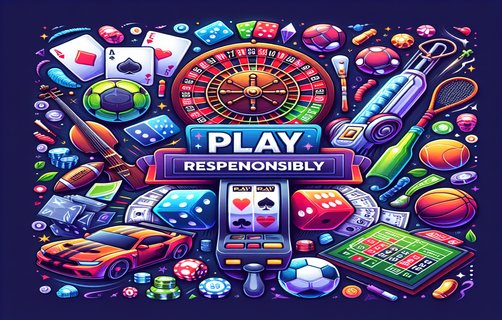Mastering Betting Strategies: A Comprehensive Guide
शर्त लगाने की रणनीतियों में मास्टरिंग: एक समग्र मार्गदर्शिका
In the dynamic world of betting, understanding the intricacies of various strategies can significantly affect the outcome for bettors. This analysis delves into crucial elements such as wager optimization, emotion management planning, and play within means. A solid foundation in these areas can help bettors navigate the unpredictable terrain of gambling while mitigating risks associated with game volatility.
Wager optimization is the first step toward successful betting. It begins with determining the right amount to stake based on personal budgets and insights from previous bets. By analyzing past performances and ongoing trends, bettors can identify patterns that either reinforce their strategies or highlight areas needing adjustment. The essence of wager optimization lies in making informed decisions that align with one’s financial goals.

Next, effective emotion management planning is essential. Betting can often invoke a range of emotions – from excitement to disappointment. Managing these emotions can be the difference between rational betting and impulsive decisions that lead to losses. Establishing clear guidelines regarding how to react to wins and losses can help maintain a balanced perspective, allowing bettors to stay focused on long-term strategies.
Playing within means cannot be overstated. Every bettor should have a predefined budget that they are comfortable with. This budget should not only reflect the potential for winning but also consider the likelihood of losses. Bettors should treat their stake like any other investment: one that has potential highs but equally possible lows. A robust financial plan balances risks and rewards, ensuring that an exciting hobby does not become an overwhelming burden.
Game volatility risk assessment is a complex yet vital part of the betting analysis. Different games have varying levels of unpredictability, and recognizing which games fit within a bettor's tolerance for risk is crucial. By assessing the historical volatility and understanding how it affects outcomes, bettors can make more strategic choices about where to place their funds.
Self-reflection is a powerful tool in the betting process. After each betting session, taking the time to review what worked and what didn’t is essential. Journaling how one felt during the session, the decisions made, and their outcomes can provide insights that help refine future betting strategies. It is this self-awareness that ultimately contributes to becoming a seasoned bettor.
Risk planning involves setting clear goals and knowing when to walk away. A well-thought-out risk management strategy allows bettors to limit exposure. This can mean setting stop-loss limits or establishing profit-taking points. Bettors who plan for potential losses and know when to cash out can protect their bankrolls.
Lastly, error control and correction cannot be overlooked. Everyone makes mistakes, but recognizing these errors in real-time and making corrections can steer a betting session back on track. This adaptability is crucial for long-term success in betting, as it allows bettors to recalibrate their strategies based on actual outcomes rather than assumptions.
In conclusion, mastering the art of betting is not just about luck; it is a calculated pursuit that blends strategy, emotion, and knowledge. Whether optimizing wagers, managing emotions, or adhering to set budgets, each component plays a significant role in creating a successful betting profile. By adopting a comprehensive approach that includes reflection, risk planning, and error correction, bettors can enhance their experience and potential for success in this thrilling endeavor.
शर्त लगाने की गतिशील दुनिया में, विभिन्न रणनीतियों की बारीकियों को समझना शर्त लगाने वालों के लिए परिणाम को महत्वपूर्ण रूप से प्रभावित कर सकता है। यह विश्लेषण आवश्यक तत्वों में गहरे उतरता है जैसे कि दांव अनुकूलन, भावना प्रबंधन योजना, और अपने अर्थ में खेलना। इन क्षेत्रों में एक ठोस आधार bettors को जुए के अनिश्चित क्षेत्र में नेविगेट करने में मदद कर सकता है जबकि खेल के अस्थिरता से संबंधित जोखिमों को कम कर सकता है।
दांव अनुकूलन सफल शर्त लगाने की दिशा में पहला कदम है। यह व्यक्तिगत बजट और पिछले दांव से अंतर्दृष्टि के आधार पर दांव लगाने के लिए सही राशि निर्धारित करने के साथ शुरू होता है। पिछले प्रदर्शन और चल रही प्रवृत्तियों का विश्लेषण करके, शर्त लगाने वाले पैटर्न की पहचान कर सकते हैं जो या तो उनकी रणनीतियों को मजबूत करते हैं या समायोजन की आवश्यकता वाले क्षेत्रों पर प्रकाश डालते हैं। दांव अनुकूलन का सार उस जानकारी पर आधारित निर्णय लेना है जो किसी के वित्तीय लक्ष्यों के साथ मेल खाती है।
अगला, प्रभावी भावना प्रबंधन योजना महत्वपूर्ण है। जुए अक्सर विभिन्न भावनाओं को जन्म देता है - उत्साह से लेकर निराशा तक। इन भावनाओं का प्रबंधन करना racional शर्त लगाने और हानिकारक निर्णय लेने के बीच का अंतर हो सकता है। जीत और हार के प्रति प्रतिक्रिया देने के लिए स्पष्ट दिशानिर्देश स्थापित करना संतुलित दृष्टिकोण बनाए रखने में मदद कर सकता है, जिससे bettors दीर्घकालिक रणनीतियों पर ध्यान केंद्रित कर सकें।
अपने अर्थ में खेलना अत्यधिक महत्वपूर्ण है। हर bettor को एक पूर्वनिर्धारित बजट होना चाहिए जिसके साथ वे सहज हों। यह बजट न केवल जीतने की संभावना को चित्रित करना चाहिए, बल्कि हानि की संभावना पर भी विचार करना चाहिए। Bettors को अपनी दांव की राशि को किसी अन्य निवेश के रूप में देखना चाहिए: एक ऐसा जो संभावित उच्चता के साथ-साथ समान रूप से संभावित निम्नतम स्थिरता भी लाता है। एक ठोस वित्तीय योजना जोखिम और पुरस्कारों को संतुलित करती है, यह सुनिश्चित करती है कि एक रोमांचक शौक अत्यधिक बोझ में न बदल जाए।
खेल अस्थिरता जोखिम मूल्यांकन एक जटिल लेकिन महत्वपूर्ण भाग है। विभिन्न खेलों में अनिश्चितता के विभिन्न स्तर होते हैं, और यह पहचानना कि कौन-से खेल एक bettor की जोखिम सहिष्णुता के भीतर आते हैं, महत्वपूर्ण है। ऐतिहासिक अस्थिरता का मूल्यांकन करके और यह समझकर कि यह परिणामों को कैसे प्रभावित करता है, bettors अपने धन को रखने के स्थान पर अधिक रणनीतिक विकल्प बना सकते हैं।
स्वयं-परावर्तन शर्त लगाने की प्रक्रिया में एक शक्तिशाली उपकरण है। प्रत्येक शर्त सत्र के बाद, यह समय निकालना महत्वपूर्ण है कि क्या काम किया और क्या नहीं। यह जर्नल करना कि सत्र के दौरान कौन-सी भावनाएं थीं, किए गए निर्णय और उनके परिणामों ने भविष्य की शर्त लगाने की रणनीतियों को परिष्कृत करने में अंतर्दृष्टि प्रदान कर सकती हैं। यह आत्म-ज्ञापन अंततः अनुभवी bettor बनने में योगदान देता है।

जोखिम योजना स्पष्ट लक्ष्यों को स्थापित करने और कब चलना है, इसे जानने में शामिल है। एक अच्छी तरह से विचार-विमर्श की गई जोखिम प्रबंधन रणनीति bettors को जोखिम कम करने की अनुमति देती है। इसका मतलब नुकसान के लिए स्टॉप-लॉस सीमाएँ निर्धारित करना या लाभ लेने के बिंदु स्थापित करना हो सकता है। वे bettors जो संभावित नुकसान के लिए योजना बनाते हैं और जब नकद निकालना जानते हैं, अपने बुनियादी सिद्धांतों की रक्षा कर सकते हैं।
अंत में, त्रुटि नियंत्रण और सुधार पर ध्यान नहीं दिया जा सकता। हर कोई गलतियाँ करता है, लेकिन इन त्रुटियों को वास्तविक समय में पहचानना और सुधार करना एक शर्त लगाने के सत्र को वापस सही मार्ग पर ले जा सकता है। यह अनुकूलता दीर्घकालिक सफलत के लिए महत्वपूर्ण है क्योंकि यह bettors को वास्तविक परिणामों के आधार पर अपनी रणनीतियों को फिर से कैलिब्रेट करने की अनुमति देती है।
अंत में, शर्त लगाने की कला में महारत हासिल करना केवल भाग्य के बारे में नहीं है; यह एक गणितीय प्रयास है जो रणनीति, भावना, और ज्ञान को मिश्रित करता है। चाहे दांव को अनुकूलित करना, भावनाओं का प्रबंधन करना या निर्धारित बजट के अनुसार रहना हो, प्रत्येक घटक सफल शर्त लगाने की प्रोफ़ाइल बनाने में महत्वपूर्ण भूमिका निभाता है। एक समग्र दृष्टिकोण अपनाकर जिसमें परावर्तन, जोखिम योजना, और त्रुटि सुधार शामिल हैं, bettors अपने अनुभव और इस रोमांचक प्रयास में सफलता की संभावनाओं को बढ़ा सकते हैं।

comments
BetWizard
This analysis provides a fresh perspective on betting strategies. A must-read for serious bettors!
LuckMaster22
I appreciate the emphasis on emotional management. It's easy to lose track when emotions run high.
WinningStreak
Great insights! I've been implementing some of these strategies and they really help.
RiskyBusiness
Wager optimization does make a difference. Planning is key to success.
BettingGenius
Self-reflection is so important after a session. Helps me adjust my approach!